新编大学英语3读写译课文翻译
新编大学英语第三册第二单元课文翻译

Unit2粗糙的乌龟壳妻子们和她们的孩子在远处的房子里讲民间故事的时候,她们的低声细语,虽然时不时地为歌声所打断,还是传到了丈夫奥康瓦的耳中。
爱克蔚菲和她的女儿,爱金玛,正坐在地板的垫子上。
现在,轮到爱克蔚菲讲故事了。
突然,窃窃私语的声音停止了,屋里所有人的目光都转向了他们最喜欢和最擅长讲故事的人。
“很久很久以前,”她开始讲到,“所有的鸟儿都被邀请去天上参加一个宴会。
他们都非常高兴,开始为这难得的日子做准备。
他们把自己涂成深红色,用颜料在身上画出漂亮的图案。
”“陆龟见到了这些准备活动。
不久,他就发现了这所有的一切其他方面的缺点,陆龟是还是一个行走江湖、见识极广的人;他了解不同民族的风俗,因此,他们都分别起了一个新的名字。
鸟儿们都有了新的名字后,陆龟也起了一个;他被称作‘你们大家’。
”“最后,他们到达了目的地;天上的主人也为他们的光临倍感荣幸。
陆龟一身盛装地站着,并对他们的邀请表达了谢意。
他的言谈举止如此得体,众鸟儿都为把他带来了而感到由衷的高兴,并点头以示他所言不谬。
他们的主人也就顺理成章地把他当作众鸟之主,尤其是,他看起来是那样的与众不同。
”“在各种精挑细捡的果品呈上来又被吃掉之后,天上的招待就把最美味的饭菜放在了他们的客人面前,而这些都是陆龟曾经见过或者梦寐以求的。
刚从火上煮过的、热气腾腾的、布满了鱼和肉的汤也被原封不动地端了上来。
陆龟开始用力地去嗅。
随着摆上来的还有捣碎的山药和伴着棕榈油和鲜鱼肉的山药汤,成壶的棕榈酒。
一切准备就绪之后,其中的一位招待走上前去,并逐个品尝了一番。
接着他就邀请众鸟儿用餐。
但是,此时的陆龟却一跃而起,问道:‘这盛宴是为谁准备的?’”“于是,陆龟就转向众鸟儿,说道:‘你们都记得,我的名字是‘你们大家’。
而这里的风俗就是先招呼发言人,然后再招呼其他人等。
等我。
新标准大学英语3课文翻译
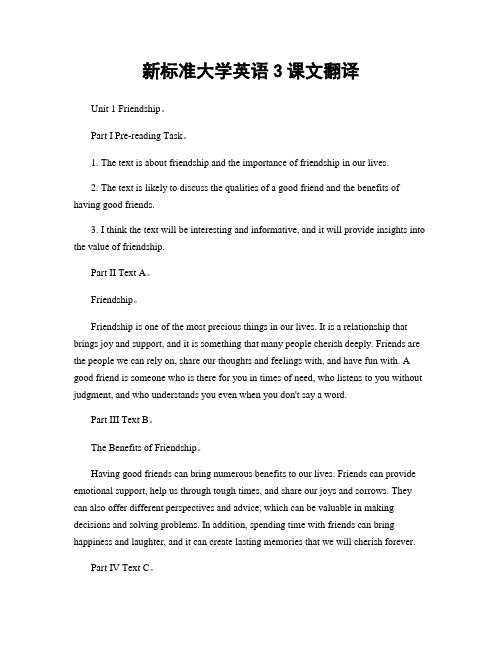
新标准大学英语3课文翻译Unit 1 Friendship。
Part I Pre-reading Task。
1. The text is about friendship and the importance of friendship in our lives.2. The text is likely to discuss the qualities of a good friend and the benefits of having good friends.3. I think the text will be interesting and informative, and it will provide insights into the value of friendship.Part II Text A。
Friendship。
Friendship is one of the most precious things in our lives. It is a relationship that brings joy and support, and it is something that many people cherish deeply. Friends are the people we can rely on, share our thoughts and feelings with, and have fun with. A good friend is someone who is there for you in times of need, who listens to you without judgment, and who understands you even when you don't say a word.Part III Text B。
新编大学英语3课后翻译(浙江大学编著)
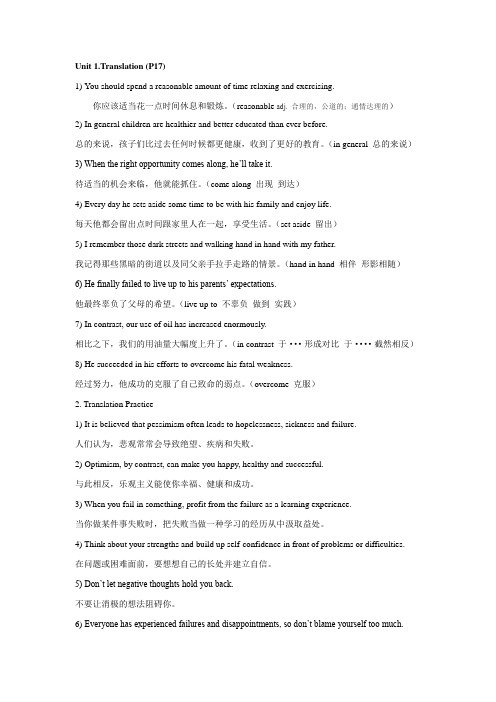
Unit 1.Translation (P17)1)You should spend a reasonable amount of time relaxing and exercising.你应该适当花一点时间休息和锻炼。
(reasonable adj. 合理的,公道的;通情达理的)2) In general children are healthier and better educated than ever before.总的来说,孩子们比过去任何时候都更健康,收到了更好的教育。
(in general 总的来说)3) When the right opportunity comes along, he’ll take it.待适当的机会来临,他就能抓住。
(come along 出现到达)4) Every day he sets aside some time to be with his family and enjoy life.每天他都会留出点时间跟家里人在一起,享受生活。
(set aside 留出)5) I remember those dark streets and walking hand in hand with my father.我记得那些黑暗的街道以及同父亲手拉手走路的情景。
(hand in hand 相伴形影相随)6) He finally failed to live up to his parents’ expectations.他最终辜负了父母的希望。
(live up to 不辜负做到实践)7) In contrast, our use of oil has increased enormously.相比之下,我们的用油量大幅度上升了。
(in contrast 于···形成对比于····截然相反)8) He succeeded in his efforts to overcome his fatal weakness.经过努力,他成功的克服了自己致命的弱点。
新编大学英语3读写译课文翻译

Unit 1 Personality羞怯的痛苦对许多人来说,羞怯是很多不愉快的起因。
各种各样的人——矮的、高的、愚笨的、聪明的、年轻的、年老的、瘦的、胖的——都说自己是羞怯的。
羞怯的人会焦虑不安,感到不自然;也就是说,他们过分地关注自己的外表和举止。
脑海中不断盘旋着一些使自己不安的想法:我给人留下的是什么印象?他们喜欢我吗?我讲话是不是傻里傻气?我长得难看。
我穿的衣服毫不引人注目。
很显然这种不安的感觉会对人产生不利的影响。
一个人的自我看法反映在自己的行为方式之中,而一个人的行为方式又影响他人的反应。
通常,人们如何看待自己对他们生活的各个方面都会产生深刻的影响。
例如,具有积极的自我价值观或很强自尊心的人往往表现出自信。
而由于自信,他们不需要他人不断地称赞和鼓励,也能使自己感觉良好。
自信者热情、自发地投入生活。
他们不因别人认为他们“该”做什么而受到影响。
有很强自尊心的人不会被批评所伤害;他们不会把批评看作是人身攻击。
相反,他们认为批评是一种提醒他们改进的建议。
相比之下,羞怯的人自尊心较弱,往往消极被动并且容易受他人影响。
他们(是否)在做“该做的事情”需要得到别人的肯定。
害羞的人对批评非常敏感;他们觉得批评正好证实了他们比别人差。
他们也很难因别人的赞美而高兴,因为他们相信自己不值得称赞。
羞怯的人也许会用这样的话来回答别人的赞美之辞:“你这么说只是为了让我感觉好一些。
我知道这不是真的。
”显然,尽管自我意识是一种健康的品质,过分的自我意识却是不利和有害的。
能否彻底消除或者至少减轻羞怯感呢?幸运的是,人们能够通过坚持不懈的努力建立自信从而克服羞怯。
由于胆怯和缺少自尊是密切相关的,因此正视自己的弱点和正视自己的优点一样重要。
例如,大多数人希望每门功课都得A。
如果仅仅因为在某些领域有困难,就把自己列为差生,这不恰如其分。
人们对自己的期望必须现实。
老是想那些不可能的事情会令自己觉得无能,甚至产生嫉妒。
当我们嫉妒比自己成绩好的学生时,我们正在自我否定。
新编大学英语3课后翻译unit2--unit7
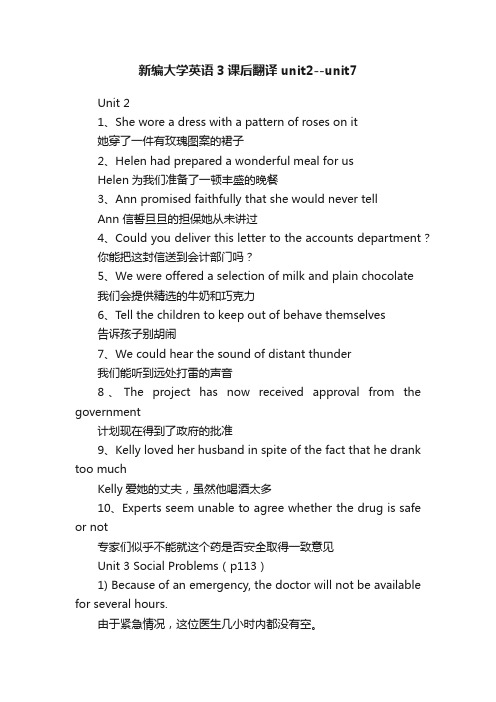
新编大学英语3课后翻译unit2--unit7Unit 21、She wore a dress with a pattern of roses on it她穿了一件有玫瑰图案的裙子2、Helen had prepared a wonderful meal for usHelen为我们准备了一顿丰盛的晚餐3、Ann promised faithfully that she would never tellAnn 信誓旦旦的担保她从未讲过4、Could you deliver this letter to the accounts department?你能把这封信送到会计部门吗?5、We were offered a selection of milk and plain chocolate我们会提供精选的牛奶和巧克力6、Tell the children to keep out of behave themselves告诉孩子别胡闹7、We could hear the sound of distant thunder我们能听到远处打雷的声音8、The project has now received approval from the government计划现在得到了政府的批准9、Kelly loved her husband in spite of the fact that he drank too muchKelly爱她的丈夫,虽然他喝酒太多10、Experts seem unable to agree whether the drug is safe or not专家们似乎不能就这个药是否安全取得一致意见Unit 3 Social Problems(p113)1) Because of an emergency, the doctor will not be available for several hours.由于紧急情况,这位医生几小时内都没有空。
新编大学英语3课文翻译 Unit 5、6、 8、9,课后翻译

新编大学英语3课文翻译 Unit 5、6、 8、9第五单元,我是怎样识字的3 你可曾在航海时遇上过有浓雾的时候?你仿佛被困在了触手可及的一片白茫茫中,不见天日。
你乘坐的巨轮,靠测深锤或测深线的指引,举步维艰地靠向海岸,既紧张又焦急不安;而你则心里砰砰直跳,等着有事要发生。
而我在接受教育之前正像那巨轮,所不同的是我连指南针或测深线都没有,更无从知晓离港湾还有多远。
我的心灵在无声地疾呼:“光明!给我光明吧! ”而就在此时此刻,爱的光芒洒在了我的身上。
(考原课文填空,英文,注意新单词) 9 那天我学会了很多新词。
现在我已记不清都是些什么词了,但我还记得其中有“妈妈、爸爸、姐妹、老师”。
这些词使得整个世界就像有了“亚伦的神杖,充满了鲜花”,为我绽开。
在这个重要的日子快要结束时,已很难找到一个比我更加幸福的孩子。
我躺在自己的小床上,回味着这一天所给予我的欣喜;渴望着新的一天的到来,这是我有生以来从未有过的期盼。
(考课文英翻汉)第六单元,人和动物的好斗性1 人类肯定是所有动物中最好斗和最残忍的。
我们会说暴徒的行为就“像野兽”,然而事实上,没有任何一种动物象人类那样残暴。
当领域性的动物或鸟类侵入了别的同类动物的领地时,后者只会做一些表示敌意的姿态以吓跑入侵者。
但是,万一有争斗,任何一方都不会受重伤,因为败方会做出姿态表示投降以便保全性命。
一般情况下,动物之间只会为了觅食而杀戮,同类动物之间自相残杀是极少见的。
(考课文英翻汉)2 然而,如果动物发现自己处于异常环境下,它会表现出特别地富有攻击性。
有一只老虎从丛林跑到村庄来,袭击了人,后来人们发现原来它的爪子受了伤,使它显然不能像平时那样去猎食。
假如不是因为受伤,这只虎毫无疑问还会呆在丛林里,并像往常那样去猎取食物。
关在动物园笼子里的动物,往往会比在野外时更加寻衅好斗。
比如说,关在笼子里的狮子一旦能自由自在地徜徉在非洲的大草原上,那么它会一直活力充沛,长途游弋,与家族同类一起追捕食物。
新编大学英语3的课文翻译

新编大学英语3的课文翻译新编大学英语3的课文翻译导语:翻译是在准确、通顺的基础上,把一种语言信息转变成另一种语言信息的行为。
下面是由小编整理的关于新编大学英语3课文翻译。
欢迎阅读!新编大学英语3课文翻译Unit 4 Career Planning职业生涯规划1、职业生涯规划不一定例行或合乎逻辑的步骤。
我们每个人都在不同的地方体重因素,可考虑某些阶段的职业规划,在不同的时间。
职业规划包括收集有关自己和了解职业,估计各种可能的结果的行动,最后,选择的替代品,我们认为有吸引力的和可行的。
2、许多观察家指出,学生是不是非常有效的职业生涯规划。
他们列举的证据表明,大多数学生中选择一种十分狭隘集团的职业;多达40至百分之六十选择专业职业,而实际上只有15日至18日的百分之劳动力从事专业工作;年轻人表现出惊人的缺乏兴趣的文书,销售,服务等职业,尽管这些领域提供了许多就业机会;多达三分之一的学生无法表示任何选择职业。
3、在书中决策,欧文詹尼斯和莱昂曼确定中存在的严重缺陷的方法很多人作出决定。
这些缺陷似乎与模式的人使用,以应付的问题。
第一个漏洞是自满。
谁无视人民挑战的信息作出的选择,他们表现出的自满。
人们谁采取的态度是“这不会影响我”或“这绝不会发生”使用自满为主导的模式行事。
当然,自满是适当的任何决定,其中任何事关重大,但这并不说明职业生涯的决定。
4、第二个漏洞,人们应付决定是防御撤销。
当面对的是一个决定,并不能认为他们可以找到一个可以接受的解决办法,有些人保持冷静,通过诉诸一厢情愿或白日梦。
学生谁不想想影响他们的职业选择往往从事合理化(欺骗自己与自我满足,但不正确的解释,一个人的行为)或拖延(推迟或拖延)。
面临的形势可能会产生焦虑,但检查的替代品也可提供救济。
5、第三个漏洞是hypervigilance 。
这发生在职业生涯决策当人们认为,没有足够的时间来寻找解决办法,他们的恐慌。
他们疯狂地寻找职业的可能性和抓住匆忙发明的解决办法,忽略了他们所选择的后果以及其他替代方案。
新编大学英语第三册课文翻译课后习题答案after_class_reading翻译1.doc
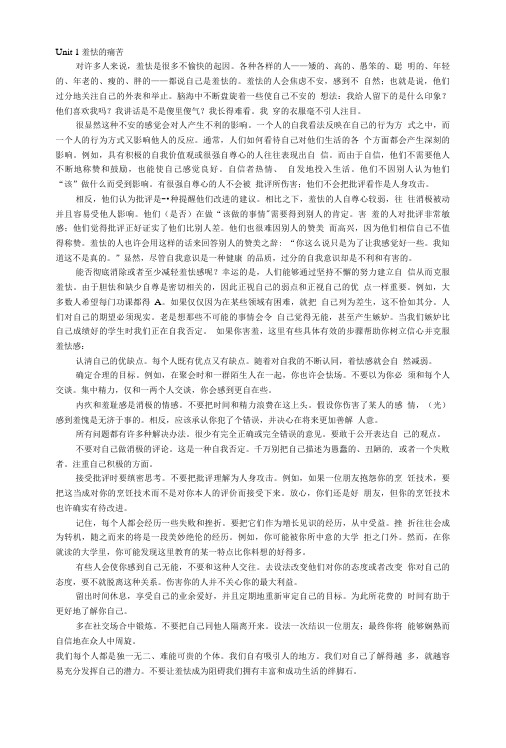
Unit 1羞怯的痛苦对许多人来说,羞怯是很多不愉快的起因。
各种各样的人——矮的、高的、愚笨的、聪明的、年轻的、年老的、瘦的、胖的——都说自己是羞怯的。
羞怯的人会焦虑不安,感到不自然;也就是说,他们过分地关注自己的外表和举止。
脑海中不断盘旋着一些使自己不安的想法:我给人留下的是什么印象?他们喜欢我吗?我讲话是不是傻里傻气?我长得难看。
我穿的衣服毫不引人注目。
很显然这种不安的感觉会对人产生不利的影响。
一个人的自我看法反映在自己的行为方式之中,而一个人的行为方式又影响他人的反应。
通常,人们如何看待自己对他们生活的各个方面都会产生深刻的影响。
例如,具有积极的自我价值观或很强自尊心的人往往表现出自信。
而由于自信,他们不需要他人不断地称赞和鼓励,也能使自己感觉良好。
自信者热情、自发地投入生活。
他们不因别人认为他们“该”做什么而受到影响。
有很强自尊心的人不会被批评所伤害;他们不会把批评看作是人身攻击。
相反,他们认为批评是-•种提醒他们改进的建议。
相比之下,羞怯的人自尊心较弱,往往消极被动并且容易受他人影响。
他们(是否)在做“该做的事情"需要得到别人的肯定。
害羞的人对批评非常敏感;他们觉得批评正好证实了他们比别人差。
他们也很难因别人的赞美而高兴,因为他们相信自己不值得称赞。
羞怯的人也许会用这样的话来回答别人的赞美之辞: “你这么说只是为了让我感觉好一些。
我知道这不是真的。
”显然,尽管自我意识是一种健康的品质,过分的自我意识却是不利和有害的。
能否彻底消除或者至少减轻羞怯感呢?幸运的是,人们能够通过坚持不懈的努力建立自信从而克服羞怯。
由于胆怯和缺少自尊是密切相关的,因此正视自己的弱点和正视自己的优点一样重要。
例如,大多数人希望每门功课都得A。
如果仅仅因为在某些领域有困难,就把自己列为差生,这不恰如其分。
人们对自己的期望必须现实。
老是想那些不可能的事情会令自己觉得无能,甚至产生嫉妒。
当我们嫉妒比自己成绩好的学生时我们正在自我否定。
新编大学英语3-浙江大学编著-外语教学与研究出版社第3单元课文翻译及课后练习

Unit 3 Social Problems挂着钥匙的小孩––––笃,笃,有人在家吗?1 在美国过去的几十年中,生活开支一直在持续上升。
食品价格、服装开支、住房开支以及学费不断增高。
母亲们已经不再扮演专职家庭主妇的传统角色,这在一定程度上是出于经济上的需要,一定程度上也是为了使自己有一种成就感。
她们越来越多地在从事着家庭以外的带薪水的工作。
2 这样重大的角色转换影响到整个家庭,尤其是小孩。
某些后果是显而易见的。
例如,晚饭时间推迟了。
然而,这种转变对感情上的影响更为微妙。
母亲们早上带着负疚感离开家,因为孩子放学回家时她们不能在家等候。
她们压抑着负疚心理,因为相信从长远来看这份工作对大家都有利。
她们的收入能够使家庭积攒起孩子的大学学费、全家度一个更长的假期、买一辆新车,等等。
3 孩子们在感情上所受到的影响是很大的。
孩子们普遍感到受了伤害,有怨恨情绪。
毕竟有好几个小时他们要独自呆在家里,而他们觉得母亲应该“在那儿”等着他们。
他们也许会需要母亲帮他们完成家庭作业,或是想把一天里的活动说给母亲听。
然而十分常见的情况是:母亲们回到家里已经疲惫不堪,又面临着一个紧迫的任务––––做饭。
她们的首要任务是为全家人做晚饭,而不是放松地聊天。
4 挂钥匙的孩子们的年龄从6岁到13岁不等。
每天他们放学回家,用挂在自己脖子上的钥匙打开家门。
然后就独自呆在安安静静、空空荡荡的房间里。
对于某些孩子来说,这是一段属于他们自己的有所作为的时间,而对于另一些孩子来说则是令人恐惧的、孤独的空虚。
为了安全的原因,许多父母不允许他们的孩子出去玩或是让别的孩子来家玩。
因此这些孩子有一种被隔离的感觉。
5 接受采访的挂钥匙的孩子们的反应不同。
一些孩子说每天有几个小时让他们独自呆在家里培养了或者说激发了他们的独立意识和责任感。
他们觉得受到了关爱与信任,而且这种感觉增强了他们的自信心。
(挂钥匙的)女孩子们通过观察母亲们如何对付家庭与工作中的难处而学习了职业母亲的行为榜样。
新编大学英语全文翻译第三册U5

我是怎样识字的海伦• 凯勒在我记忆中,我一生最重要的日子是我的老师安妮•曼斯菲尔德•沙利文走进我生活的那一天。
至今,每当我想起这一天仍会惊叹不已:是这一天把(我过的)截然不同的两种生活连在一起。
在我记忆中, 那是1887年3月3日,离我7岁生日还有三个月。
在那个重要日子的午后,我呆呆地站在我家的门廊上,内心充满了期盼。
从我母亲给我的手势和屋子里众人来来往往的忙碌中我隐约猜到将有不同寻常的事发生,于是我来到门口,在台阶上等着。
午后的阳光透过覆盖着门廊的忍冬花簇照射到我仰起的脸庞上。
我的手指近乎下意识地抚弄着这些熟悉的叶片和花朵。
它们刚刚抽叶开花,迎来南方温馨的春天。
至于我的未来究竟会出现什么样的奇迹,我茫然不知。
几个星期来,愤怒和怨恨一直折磨着我。
这种激烈的感情争斗之后则是一种极度的疲惫。
你可曾在航海时遇上过浓雾?那时,你仿佛被困在了触手可及的一片白茫茫中,不见天日。
你乘坐的巨轮,靠测深锤和测深线的指引,举步维艰地靠向海岸,既紧张又焦急不安;而你则心里怦怦直跳,等着什么事情发生。
我在接受教育之前正像那艘巨轮,所不同的是我连指南针或测深线都没有,更无从知晓离港湾还有多远。
我的心灵在无声地疾呼:“光明!给我光明吧!”而就在那个时刻,爱的光芒洒在了我的身上。
我感觉到有脚步由远及近。
于是我伸出了手,以为会是母亲。
有人抓住了我的手,将我抱住并紧紧地搂在了怀里。
正是这个人的到来,把整个世界展示给我,最重要的是给我带来了爱。
在老师来到我家的第二天上午,她把我带到她的房间,这娃娃是帕金斯学校的小盲童们送给我的礼物,劳拉•布里奇曼给娃娃穿上了衣服,不过这些是我在后来才知道的。
给了我一个玩具娃娃。
我玩了一小会儿之后,沙利文小姐慢慢地在我的手上拼出了“d-o-l-l”(玩偶娃娃)这个词。
我一下子便对这种手指游戏产生了兴趣,而且试着模仿它。
当我终于正确地拼出了这几个字母时,内心充满了孩子气的喜悦和自豪。
我跑到楼下找到母亲,伸手拼出了“玩偶娃娃”所含的字母。
新编大学英语第三册课后答案课文翻译

Unit 1 PersonalityVocabulary (P16)1. 1) self-conscious 2) self-confidence 3) self-esteem 4) self-destructive 5) self-worth6) self-concept 7) Self-awareness 8) self-assurance/self-confidence2. 1)B 2)I 3)L 4)A 5)H 6)D 7)E 8)N 9)J 10)M 11)C 12)F 13)G 14)K3. 1) profound 2) jealousy 3) numerous 4) overweight 5) overcome 6) eventually 7) slim8) compliments 9) diminish 10) reassurance 11) detrimental 12) isolated 13) self-esteem 14) accented 4. 1) reflected 2) concerned/worried 3) profound effect/influence 4) viewed/regarded 5)sensitive6) respond/react 7)eliminated 8)overcome my fear 9) concentrate on 10) made no comment Translation (P17)1) You should spend a reasonable amount of time relaxing and exercising.2) In general children are healthier and better educated than ever before.3) When the right opportunity comes along, he’ll take it.4) Every day he sets aside some time to be with his family and enjoy life.5) I remember those dark streets and walking hand in hand with my father.6) He finally failed to live up to his parents’ expectations.7) In contrast, our use of oil has increased enormously.8) He succeeded in his efforts to overcome his fatal weakness.Part Four Writing and Translation (P46)2. Translation Practice1) It is believed that pessimism often leads to hopelessness, sickness and failure.2) Optimism, by contrast, can make you happy, healthy and successful.3) When you fail in something, profit from the failure as a learning experience.4) Think about your strengths and build up self-confidence in front of problems or difficulties.5) Don’t let negative thoughts hold you back.6) Everyone has experienced failures and disappointments, so don’t blame yourself too much.Unit 2 Myths and LegendsVocabulary (P62)1. 1) A. invitation B. invited C. inviting 2) A. prepare B. prepared C. preparation D. preparatory/preparation3) A. discoveries B. discoverers C. discovered4) A. approval B. approve C. approved D. approving E. disapprove5) A. eloquent B. eloquence C. eloquently6) A. faithful B. unfaithful/faithless C. faith d. faithfully7) A. occasional B. occasionally C. occasion8) A. delivery B. delivering C. delivered9) A. troublesome B. troubled C. troubled D. troubling10) A. assurance B. assured C. assure2. 1) got/ran into trouble 2) no trouble 3) asking for trouble 4) have … trouble 5) trouble with 6) in serious/deep/big trouble 7) get/getting … into trouble 8) took the trouble3. 1) with a pattern of roses 2) prepared a wonderful/goof meal for us3) promised faithfully 4) deliver this letter5) a selection of milk and plain chocolate 6) keep out of mischief/behave themselves7) the sound of distant thunder 8) received approval from the government9) in spite of the fact that he drank too much 10) agree whether the drug is safe or notPart Three Further Development5. Complete the following Ancient Chinese story by translating the Chinese into English(P93)1) the true reason why there was no such animal in Guizhou2) they were of no use at all in this place3) when he saw the donkey all of a sudden, he thought it was a monster4) he hid himself in the trees while looking at the donkey5) what kind of animal is this and why does it look different from other animals that I’ve seen?6) But one day the donkey stretched its thin neck and cried7) the tiger discovered that the donkey didn’t have any other skills besides crying8) But he dared not rush to it and eat it just as he did to other animals9) This did irritate the donkey (made the donkey angry), who raised its hind leg and kicked the tiger10) This time he rushed to it without hesitation and bit its rhroatPart Four Writing and Translation2. Translation Practice(P96)万物之初,天地还是一体,充满混沌。
新编大学英语3课后练习答案与课文翻译(一)
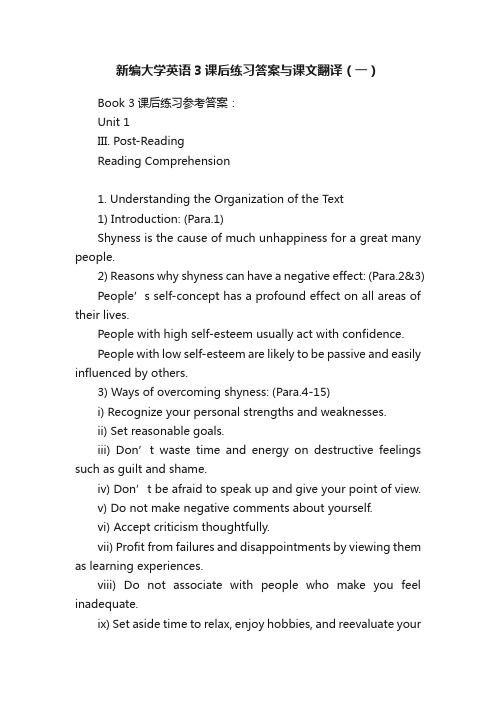
新编大学英语3课后练习答案与课文翻译(一)Book 3课后练习参考答案:Unit 1III. Post-ReadingReading Comprehension1. Understanding the Organization of the Text1) Introduction: (Para.1)Shyness is the cause of much unhappiness for a great many people.2) Reasons why shyness can have a negative effect: (Para.2&3)People’s self-concept has a profound effect on all areas of their lives.People with high self-esteem usually act with confidence.People with low self-esteem are likely to be passive and easily influenced by others.3) Ways of overcoming shyness: (Para.4-15)i) Recognize your personal strengths and weaknesses.ii) Set reasonable goals.iii) Don’t waste time and energy on destructive feelings such as guilt and shame.iv) Don’t be afraid to speak up and give your point of view.v) Do not make negative comments about yourself.vi) Accept criticism thoughtfully.vii) Profit from failures and disappointments by viewing them as learning experiences.viii) Do not associate with people who make you feel inadequate.ix) Set aside time to relax, enjoy hobbies, and reevaluate yourgoals regularly.x) Practice being in social situations.4) Conclusion: (Para.16)The better we understand ourselves, the easier it becomes to live up to our full potential.2. Understanding Specific Information1) F 2) F 3) T 4) T 5) T 6) F 7) T 8) F 9) F 10) T3. Group Discussion1) I think the most effective ways of overcoming shyness are the first and seventh ways. Recognizing our personal strengths and weaknesses is useful because if we know ourselves better, we can feel more self-confident. We can be more objective, instead of being blind. The seventh way is to profit from failures and disappointments as learning experiences. If we allow ourselves to get discouraged and sad when we fail, then we will feel more unsure of ourselves. But if we think of a failure as a learning experience, we are adopting a positive attitude. By analyzing objectively why we failed and planning how to set about doing things differently we will be more likely to succeed next time.2) Modesty is used to describe a reserved appraisal of one’s merits, abilities or success, e.g. she is very modest about her accomplishments. Shyness is used to describe the uncomfortable feeling one has in the company of others. It often implies a lack of self-confidence and a timid, reserved manner. Modesty is a good personality trait while shyness in many cases is undesirable.3) Yes, it is appropriate and normal to be shy in some circumstances: in the presence of teachers, your boss, your parents’ friends or your prospective in-laws; when you aredating someone, especially the first time; when you are with strangers; when you are in a new environment; when you’re facing a large audience.Vocabulary1. Self- is a prefix which means “of, to or by oneself or itself.”Words with the prefix self- that appear in the text: self-conscious, self-concept, self-assurance, self-worth, self-confidence, self-esteem, self-destructive, self-awareness, self-acceptance, self-rejection, self-confident1) self-conscious (worried and embarrassed about what you look like or what other people think of you)2) self-confidence (belief in one’s own ability, power, judgment, etc.; confidence in oneself)3) self-esteem (the feeling that you are someone who deserves to be liked, respected, or admired)4) self-destructive (with thoughts or actions that are counter to one’s own best interests)5) self-worth (the value you give to your life and achievements)6) self-concept (one’s conception or general idea of one’s own basic character and nature)7) self-awareness (realistic knowledge and judgment about oneself)8) self-assurance/self-confidence (the belief that you are able to deal with people and problems easily)2. Part A1) B 2) I 3) L 4) A 5) H 6) D 7) E 8) N 9) J 10) M11) C 12) F 13) G 14) KPart B1) profound 2) jealousy 3) numerous 4) overweight 5) overcome 6) eventually7) slim 8) compliments 9) diminish 10) reassurance 11) detrimental 12) isolated13) self-esteem 14) accented3. 1) reflected 2) concerned/worried 3) profound effect 4) viewed/regarded 5) sensitive6) respond/react 7) eliminated 8) overcome my fear 9) concentrate on 10) made no commentTranslation1.You should spend a reasonable amount of time relaxing and exercising.2. In general children are healthier and better educated than ever before.3. When the right opportunity comes along, he’ll take it.4. Every day he sets some time aside to be with his family and enjoy life.5. I remember those dark streets and walking hand in hand with my father.6. He finally failed to live up to his parents’ expectations.7. In contrast, our use of oil has increased enormously.8. He succeeded in his efforts to overcome his fatal weakness.Unit 2Post-ReadingReading Comprehension1. 1) Because they were invited to a feast in the sky.2) He saw the birds were busy preparing.3) He planned to go to the feast/sky with the birds.4) They didn’t agree because Tortoise was mischievous/cunning and ungrateful.5) With a sweet tongue, he convinced the birds that he wasa changed man.6) He made two wings with all the feathers he got from each bird.7) All of you.8) Nuts, meat and fish soup, pounded yam, yam soup, palm wine, etc.9) For whom have you prepared this feast?10) Because he knew the answer would be “For all of you”, which was his new name. So he could enjoy all the food first.11) They were very angry.12) They took back the feathers they had lent him.13) He asked them to take a message to his wife.14) Parrot, because he wanted to take advantage of the chance to get revenge.15) He asked Parrot to tell his wife to bring out all the soft things in his house to cover the ground with them so that he would be able to land safely. But Parrot told his wife to bring outall the hard and sharp, not the soft, things instead.16) His shell was broken into hundreds of pieces.2. Ekwefi is telling a story about Tortoise. Long long ago, there was a famine, and the birds got an invitation from the sky to attend a feast there. Tortoise learned about it and with his sweet tongue he persuaded the birds to take him with them and so each bird lent him a feather. Tortoise cunningly thought of an idea that enabled him to have all the food by naming himself “All of you.” When they reached the sky, they received a warm welcome and soon the food was presented to them. Then he asked one of the people in the sky: “For whom have you prepared all this feast?” The man replied: “For all of you.” So he ate almost all the best food. The birds became very angry and took back their feathers before flying home. Without feathers, he had to jump onto the ground and his shell was broken into pieces.3. Acting out the StorySampleBird A: How exciting! All of us are invited to the feast in the sky.Bird B: I just can’t wait. What do you think I should wear?Tortoise: Hello. Good morning. What are you excited about?Bird A: Didn’t you know that we are going to the sky?Bird B: And we are going to have a big dinner. What fun!Tortoise: How nice it is. What lucky guys. May I go with you? I’m sure we’ll have a lot of fun.Bird A: Yes, we’ll have great fun, but not you. We know you too well. You are full of cunning and you are ungrateful.Bird B: If we allow you to come with us, you will soon beginyour mischief.Bird A: We know you of old.Tortoise: You don’t know me now. I’m a changed man. I am not the mischievous man you once knew. In fact, I am thoughtful and well-meaning. I have learned that a man who makes trouble for others is also making trouble for himself. Rest assured, I promise you I will not cause you any trouble.Bird A: (Talking to Bird B) Maybe he is a changed man now. Let’s talk to our bird friends and see if we will take him with us.(After a brief discussion with all the other birds)Bird B: Ok. Tortoise, now we all agreed to take you to the sky. Each of us will lend you a feather so that you can have two wings to fly.(During the flight to the party)Bird A: Tortoise is a great orator!Bird B: Let’s make him the spokesperson for the party.Tortoise: Did you know that we need a new name when we are invited to a great feast like this? It is an age-old custom and our hosts in the sky will expect us to honor it.Bird A: We haven’t heard of this be fore. But as you are such a learned man, if you say this, we will choose a new name for ourselves. I will call myself Good-Looking.Bird B: I am Smart-Ass.Tortoise: And my new name is All of You.(On their arrival at the sky)Sky people: Welcome to the sky, our dear bird friends. We are so pleased tosee you again. Please make yourselves at home.Tortoise: My dear respected friends, thank you so much for inviting us to the sky. Nothing can make us happier than this. Itis our greatest honor to be here and have a good time with you.Sky people: Thank you for your nice words. Now please help yourselves to the nuts.Bird A: Tortoise is really eloquent, isn’t he? I’m glad we decided to bring him with us.Bird B: Yes. And these are delicious nuts.Sky people: Now the dinner is ready. Please enjoy the soup, meat, fish and pounded yam. Here is palm wine, too.Tortoise: Just a moment. Let me ask you first. For whom have you prepared this feast?Sky people: For whom? Why? For all of you, of course.Tortoise (T o the birds): You remember that my name is All of You. The custom here is to serve the spokesman first and the others later. They will serve you when I finish.Sky people (To themselves): Looks like it is their custom to leave all the food to their king first.Tortoise: Mm. Yummy. Mm. I’m full now. You can start to eat.Bird A: We should never bring him here. I am too angry to eat. I’m going home.Bird B: Wait. I am leaving, too. Take the feather with us.Tortoise: What are you doing? Leave me the feather. Oh, how am I going home without a single feather? You can’t do this to me?Birds: Bye.Tortoise: Could someone take a message for my wife? Tell her to bring out everything soft and cover the ground. …4. Taking SidesSamples1) -- I don’t admire Tortoise’s cl everness. He was unwise to cheat all the birds. After his mischief, how could he have face to live together with them any longer? He would have no friends at all. He was clever, but at the same time he was also stupid. When all the birds became so angry, how could he have trusted Parrot? He should have jumped into the sea to avoid being hurt.-- I admire Tortoise’s cleverness. He was a guy who knew where to look for a nice dinner during a time of famine. He knew very well how to get trust from others. He was also quick-minded. His only mistake was that he should not be so greedy as not to leave any nice food for the birds.--I sympathize with the birds. They took Tortoise with them to the sky out of kindness, but after flying such a long distance, they had to fly back home on an empty stomach. They were formally invited, but the food was enjoyed by Tortoise, who hadn’t been formally invited. I think the birds were very unlucky.-- I think the birds are stupid. They knew very well that Tortoise couldn’t be tr usted as he was always mischievous. But they persuaded themselves that he was a changed man. At the party they should have let the sky people know Tortoise was not their king and they had the right to have some of the nice food, as they were the guests.2) I learned from the story that a) we should be honest, and shouldn’t cheat others. If we cheat others, we will be punished in the end; b) we shouldn’t be carried away by sweet words, like the birds; c) a leopard can’t change its spots, nor can Tortoise. He was cunning, he could never change his personality and behave himself.Vocabulary1. 1) A. invitation B. invited C. inviting2) A. prepare B. prepared C. preparation D. preparatory/preparation3) A. discoveries B. discoverers C. discovered4) A. approval B. approve C. approved D. approving E. disapprove5) A. eloquent B. eloquence C. eloquently6) A. faithful B. unfaithful/faithless C. faith D. faithfully7) A. occasional B. occasionally C. occasion8) A. delivery B. delivering C. delivered9) A. troublesome/trouble B. troubled C. troubled D. troubling10) A. assurance B. assured C. assure2. 1) ran/got into trouble 2) no trouble 3) asking for trouble4) have…trouble 5) trouble with 6) in serious/deep/big trouble7) get/getting…into trouble 8) to ok the trouble3.1) with a pattern of roses2) prepared a wonderful/good meal for us3) promised faithfully4) deliver this letter5) a selection of milk and plain chocolate6) keep out of mischief/behave themselves7) the sound of distant thunder8) received approval from the government9) in spite of the fact that he drank too much10) agree whether the drug is safe or notUnit 3IV. Post- ReadingReading Comprehension1. What the Text Discusses1) financial 2) career 3) later 4) guilty 5) hurt 6) resentful7) productive 8) independence 9) responsibility 10) trusted11) frightening 12) resentment 13) abandoned 14) factors 15) quality2. Understanding Specific Information1) T 2) F 3) T 4) F 5) T 6) F 7) F 8) F 9) F 10) F3. Comparing ExperiencesSample 1In our group, two of us were latchkey children, two were taken care of by their grandparents, and one was taken care of by his mother because his mother did not work. The two who were once latchkey children had felt very much the same as the children mentioned in the passage. They felt lonely and watched TV a lot. But compared with the other students in our group, they are more independent. So in a way, it is good to leave children alone for some time every day.Sample 2In our group, only one person was once a latchkey child. Both her parents were working far away from home and she had to be on her own for most of the time on weekdays. The rest of us were taken care of either by our grandparents or by our parents. Every day when we came home after school, there was alwayssomebody there waiting for us and taking care of us. We could also go out and play with other children after we finished our homework. But sometimes we did wish we were alone so that we could spend the time as we wished.Vocabulary1. 1) c 2) h 3) g 4) a 5) e 6) k 7) i 8) d 9) l 10) b 11) j 12) f2. 1) constantly 2) impact 3) burden 4) Candidly 5) fulfillment 6) salaried 7) resentment 8) assistance9) perfect 10) suppress3. 1) successfully 2) resentment 3) security 4) necessity 5) advisable6) access/accessibility 7) athletic 8) maturity 9) emotional 10) effectively4. Sentence-Making GameSuggestions for teachers:Step 1: Write on the blackboard about 20 words or phrases that appear in the text. An even number is desirable since the students will be divided into 2 groups.A possible list:rise decade expense financial affect on the other hand priorityengage range forbid isolate stimulate express claim widespreadgiven work out take into consideration in case of secure arise cope with demand provideStep 2: Divide the students into two groups.Step 3: The students make sentences using the words on the blackboard. Each sentence can include more than one word and must be meaningful and grammatically correct. One point is awarded for each correctly used word. The teacher crosses out the word which has been correctly used. If the word is crossed out, it cannot be used again.Step 4: Students are encouraged to work quickly and raise their hands as soon as they come up with a sentence. The teacher works as a judge; the group that gets higher points wins.TranslationDirections: Translate the following sentences into English, using the expressions in brackets.1) Because of an emergency, the doctor will not be available for several hours.2) How will taxes affect people with low incomes?3) My mother always told me that in the long run I would be glad I didn’t give up practicing the piano.4) The books range in price from $10 to $20.5) It seems to me that you don’t have much choice.6) Given their inexperience, they have done quite a good job.7) For such a big house the price is fairly cheap/low, but you’ve got to take into consideration the money you will spend on repairs.8) Can we begin by discussing questions/problems arising from the last meeting?Unit 4III. Post-ReadingReading Comprehension1. 1) Introduction (Para. 1):Career planning does not necessarily follow routine or logical steps.2) Students’ weaknesses in career planning (Para. 2):i. Most students choose from a very narrow group of occupations.ii. 40 to 60 percent of the students choose professional occupations, but only15 to 18 percent of the work force is engaged in professional work.iii. Young men lack interest in fields that offer many job opportunities.iv. A third of the students are unable to express any choice of occupation.3) Serious flaws in the ways of decision making (Para. 3-5)i. Complacency – ignoring challenging information.ii. Defensive avoidance –resorting to wishful thinking or daydreaming.iii. Hypervigilance –searching frantically for career possibilities and seizingon hastily invented solutions.4) Keys to career planning (Para. 6-11)i. Study yourself.ii. Write your career goals down.iii. Review your plans and your progress periodically with another person.iv. If you choose a career that does not fit you, you can start over.5) Changes in careers (Para. 12-13)i. Few changes involve downward movement; most involve getting ahead.ii. Job changes and career shifts occur at all ages.6) Conclusion (Para. 14-15)Although there is no sure way to make career plans work out, there are things that you can do now to shape your career possibilities.2. 1) T 2) T 3) F 4) T 5) F 6) T 7) T 8) T 9) T 10) F 11) T 12) F3. Job Application and RecruitmentAn alternative activity for the teacher to organize for the class: The teacher may organize an interview in the following way:1) Choose an interview panel of three or four students. Choose three students for the panel to interview for the job of a store detective. Hold the interviews. When they are over, the panel should discuss the qualifications of the applicants and choose the one they think is best.2) Ask the class to talk about the interviews. Ask questions such as:A. Do you agree with the panel’s decision?B. How could the applicants have done better?C. Were the interviews fair?Sample answers-- I agree with the panel’s decision. First, the applicant is very confident in answering the questions and he knows what he is supposed to do. Second, he is quick-minded and very strong. Third, he is interested in the job and is ready to dedicate himself to the job. Finally, he has previous experience in working as a store detective.-- I don’t agree with the panel’s decision. I t hink the panel puts too much emphasis on the appearance of the applicants. I think Applicant B is much more suited for the job. He has a warmer personality. He can be a good store detective as well as a good staff member, because I don’t think the sole responsibility for a detective is to check on the shoppers. He should also help the customers when possible.-- Generally speaking, I think the panel has made a wise decision and chosen the right one for the job. Yet I think the applicant could have done better by not being so conceited and bragging about his own ability. After all, people cannot trust too much what a person says about himself without further investigation. What’s more, team spirit is very important. If he is not easy-going and feels too good about himself, it will be difficult for others to cooperate with him. Also I doubt whether he will be listening to the boss.Vocabulary1. 1) acceptable 2) efficiency 3) implications 4) instability 5) rationalize6) evaluation 7) foreseeable 8) invention 9) hastily 10) probability11) professional 12) challenging 13) defensive 14)personality2. 1) in case 2) Every so often 3) resort to 4) talk over 5) start over6)in reality 7) at stake 8) seized on 9) leading to 10) take stock of3. 1) programs 2) way 3) technical 4) both 5) provided 6) who7) such 8) needed 9) opportunities 10) when 11) to 12) Completion 13) holding 14) early 15) hire 16) promote 17) up 18) educatingTranslation1. He underwent a major heart surgery several years ago.2. We estimated that it would take a week to finish the work.3. I used to enjoy photography, but I now have no time to pursue any hobbies.4. You may love someone but not necessarily have to marry him.5. Terrorists resort to violence to achieve their political aims.6. He says he’ll stay in the office this afternoon in case you want to see him.7. Scientists have identified the gene that causes abnormal growth.8. These examples demonstrate how badly some students write their résumés.Unit 6III. Post-ReadingReading Comprehension1. Understanding the Main Idea of the PassageA Comparison of Animal and Human AggressionAnimals Human beingsCauses of aggression 1) Abnormal conditions 8) Living conditions in crowded cities.Consequences 2) It will show abnormal aggressiveness. 9) People may behave aggressively toward each other.Examples 3) A tiger once came out of the jungle into a village and attacked a man.4) The caged lion often becomes more aggressive than it would be in the wild. 10) A once self-employed crafts-man and people who once worked in a small firm will express aggression through resentment and anger.11) A man may kill thousands of people by dropping a bomb from a plane.Behavior in desirable situations 5) The tiger would have stayed in the jungle and hunted for food in the customary way.6) The caged lion would be continually active, ranging over long distances, hunting in family groups. 12) People might have been no more aggressive than their fellow creatures.13) The man would hesitate to hit another person in front of his eyes.Possible solutions 7) The lion should be free to wander on the grassy plains of Africa. 14) Hostility and aggression should beexpressed in constructive activity and non-violent competition.2. Understanding Specific Information1) D 2) C 3) A 4) C 5) D 6) B3. Questions for Group Discussion1) –Yes. There were 2 world wars before, during which large numbers of people were killed and the great majority of them were innocent. Human beings or the whole world can be destroyed if nuclear or biological weapons should be used by violent insane people. We have never heard of anything like these in the animal world. Besides humans have killed large numbers of animals for food, clothes, medical research, pleasure, or for no reason at all. So I think humans are much more aggressive than animals.– No, animals are, in general, more aggressive than humans. Humans are good by nature, while animals have no power of reasoning. What’s more,animals have more physical force and other defenses such as claws and fangs. Without weapons, man is weaker and less aggressive than animals.2) – Yes, sports are generally a good way to channel energy and aggression, especially boxing, wrestling, ball games, etc. International sports enable athletes from many countries to meet and to compete for medals. T o prepare for international sports competitions, they have to improve their skills, strengthen their muscles, develop effective strategies, etc. Others, non-athletes, will feel concerned with them, excited with them, and proud of them, and cheer for them.– No, the Olympic Games are just sports competitions. Theywon’t change the political ideas of nations. We have never heard of any sports games that have stopped disputes, conflicts, wars, etc., but on the other hand there were athletes who were prevented from participating in the Games because of international conflicts. And there have been acts of terrorism, and examples of unfair judgments and aggressive behavior at the Olympic Games.Vocabulary1.Verb Noun Adjective Adverbaggress aggression aggressive aggressively/ violence violent violentlybehave behavior / // territory territorial // hostility hostile /disable disability disabled /compare comparison comparative/comparable comparatively/comparablelydestroy destruction destructive destructivelyresent resentment resentful resentfullyconstruct construction constructive constructivelycompete competition competitive competitively/ evidence evident evidently2. violent —non-violent doubtfully — undoubtedlysatisfied — dissatisfied normal — abnormalconstructive — destructive personal — impersonaldiminish — increase encourage — discourage3.1) survive 2) conflicts 3) available 4) likely5) injuring 6) absorbed 7) competition 8) instinct9) hesitated 10) similar4.Aggression is the fighting instinct in beast and man, which is directed against members of the same species. It is theorized that in natural conditions aggression helps to ensure survival of individuals (and thus the species), by preventing too dense a population from developing and exhausting all of its food sources. Fighting is generally considered to be a trait characteristic of males and uncharacteristic of females. However, many but not all female mammals exhibit aggression during the postpartum (产后的) period in defense of their young.The great animal behaviorist Konrad Lorenz observed that in every individual the readiness to fight is greatest in the most familiar place: in the middle of its territory. As the distance from territory increases, readiness to fight decreases proportionately. This was not the case with my pet rat; he was ready and willing to beat up his neighbors the minute he stepped through their door. What causes some rats to be more aggressive than other s? There is certainly evidence that aggression has a genetic basis, at least in some animals.Translation1. She always behaves badly when her aunt comes to visit.2) If it hadn’t been for your help, we wouldn’t have beenable to finish the task in time.3) I warned him off going to the east coast because it was full of tourists.4) The fact that something is cheap doesn’t necessarily mean it’s of low quality.5) Without anyone to turn to for help, making an appropriate choice can be difficult.6) His sadness at the death of his wife found expression in his music.7) Only if Peter goes to the evening party will she go.8) I can only compare the experience to a nightmare.Unit 7III. Post-ReadingReading Comprehension1. Understanding the Organization of the TextA. Two things that I was dissatisfied with (Para.1-3)1. My job2. My engagementB. Purpose of my trip (Para.4-6)3. To transform myselfC. Process for change (Para.7-14)4. I created a mindset that made me ready for change.5. I insulated myself from the usual influences in my life and the people whose approval was most important.6. I structured my time in order to produce change and growth.7. I pushed myself to experiment with new ways of being.8. I made public commitments of what I intended to do, so it would be harder to back down.9. I processed my experiences systematically.10. I made changes when I returned that continued the transformation that started while I was in Aruba.D. Conclusion (Para.15)11. I would continue going on transformative trips to keep my growth in the future.2. Retelling the Process for Change“The writer was determined and ready to make changes. First, he made a point of getting away* from familiar situations and people that he wanted to impress. Next, he organized his days so that he could do activities that helped him change and develop. After that, he made an effort to try new ways of doing things. Then, he announced publicly what he planned to do so that it would be difficult for him to break his promises. Later, he analyzed his experiences in a logical way. When he returned, he changed things in his life so that he would continue the process that began while he was away. The process for change was a success.”*make a point of doing something: be certain that one does something, usually in an obvious way.e.g. From then on he made a point of avoiding her.3. Understanding Specific Information1) C 2) C 3) D 4) A 5) C 6) A 7) C 8) D 9) B 10) A。
新编大学英语第三册第三版第一单元课文翻译及课后练习答案
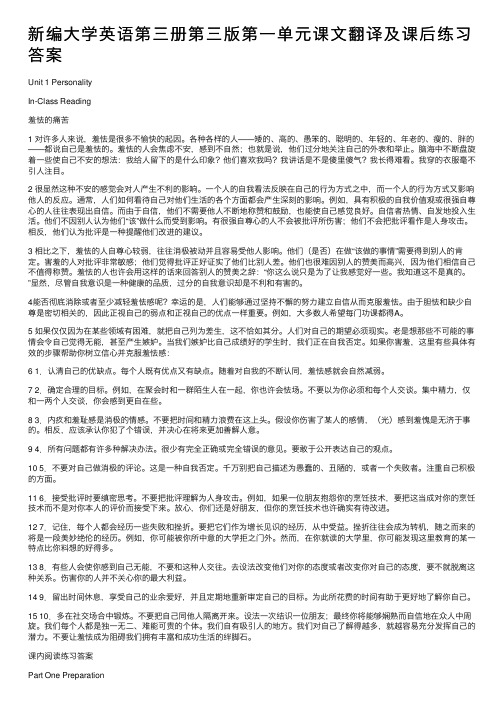
新编⼤学英语第三册第三版第⼀单元课⽂翻译及课后练习答案Unit 1 PersonalityIn-Class Reading羞怯的痛苦1 对许多⼈来说,羞怯是很多不愉快的起因。
各种各样的⼈——矮的、⾼的、愚笨的、聪明的、年轻的、年⽼的、瘦的、胖的——都说⾃⼰是羞怯的。
羞怯的⼈会焦虑不安,感到不⾃然;也就是说,他们过分地关注⾃⼰的外表和举⽌。
脑海中不断盘旋着⼀些使⾃⼰不安的想法:我给⼈留下的是什么印象?他们喜欢我吗?我讲话是不是傻⾥傻⽓?我长得难看。
我穿的⾐服毫不引⼈注⽬。
2 很显然这种不安的感觉会对⼈产⽣不利的影响。
⼀个⼈的⾃我看法反映在⾃⼰的⾏为⽅式之中,⽽⼀个⼈的⾏为⽅式⼜影响他⼈的反应。
通常,⼈们如何看待⾃⼰对他们⽣活的各个⽅⾯都会产⽣深刻的影响。
例如,具有积极的⾃我价值观或很强⾃尊⼼的⼈往往表现出⾃信。
⽽由于⾃信,他们不需要他⼈不断地称赞和⿎励,也能使⾃⼰感觉良好。
⾃信者热情、⾃发地投⼊⽣活。
他们不因别⼈认为他们“该”做什么⽽受到影响。
有很强⾃尊⼼的⼈不会被批评所伤害;他们不会把批评看作是⼈⾝攻击。
相反,他们认为批评是⼀种提醒他们改进的建议。
3 相⽐之下,羞怯的⼈⾃尊⼼较弱,往往消极被动并且容易受他⼈影响。
他们(是否)在做“该做的事情”需要得到别⼈的肯定。
害羞的⼈对批评⾮常敏感;他们觉得批评正好证实了他们⽐别⼈差。
他们也很难因别⼈的赞美⽽⾼兴,因为他们相信⾃⼰不值得称赞。
羞怯的⼈也许会⽤这样的话来回答别⼈的赞美之辞:“你这么说只是为了让我感觉好⼀些。
我知道这不是真的。
”显然,尽管⾃我意识是⼀种健康的品质,过分的⾃我意识却是不利和有害的。
4能否彻底消除或者⾄少减轻羞怯感呢?幸运的是,⼈们能够通过坚持不懈的努⼒建⽴⾃信从⽽克服羞怯。
由于胆怯和缺少⾃尊是密切相关的,因此正视⾃⼰的弱点和正视⾃⼰的优点⼀样重要。
例如,⼤多数⼈希望每门功课都得A。
5 如果仅仅因为在某些领域有困难,就把⾃⼰列为差⽣,这不恰如其分。
大学新编三英语课文翻译

UNIT1我哥哥吉米出生时遇上难产,因为缺氧导致大脑受损。
两年后,我出生了。
从此以后,我的生活便围绕我哥哥转。
伴随我成长的,是“到外面去玩,把你哥哥也带上。
”不带上他,我是哪里也去不了的。
因此,我怂恿邻居的孩子到我家来,尽情地玩孩子们玩的游戏。
我母亲教吉米学习日常自理,比如刷牙或系皮带什么的。
我父亲宅心仁厚,他的耐心和理解使一家人心贴着心。
我则负责外面的事,找到那些欺负我哥哥的孩子们的父母,告他们的状,为我哥哥讨回公道。
父亲和吉米形影不离。
他们一道吃早饭,平时每天早上一道开车去海军航运中心,他们都在那里工作,吉米在那搬卸标有彩色代号的箱子。
晚饭后,他们一道交谈,玩游戏,直到深夜。
他们甚至用口哨吹相同的曲调。
所以,父亲1991年因心脏病去世时,吉米几乎崩溃了,尽管他尽量不表现出来。
他就是不能相信父亲去世这一事实。
通常,他是一个令人愉快的人,现在却一言不发,无论说多少话都不能透过他木然的脸部表情了解他的心事。
我雇了一个人和他住在一起,开车送他去上班。
然而,不管我怎么努力地维持原状,吉米还是认为他熟悉的世界已经消失了。
有一天,我问他:“你是不是想念爸爸?”他的嘴唇颤抖了几下,然后问我:“你怎么看,玛格丽特?他是我最好的朋友。
”接着,我俩都流下了眼泪。
六个月后,母亲因肺癌去世,剩下我一人来照顾吉米。
吉米不能马上适应去上班时没有父亲陪着,因此搬来纽约和我一起住了一段时间。
我走到哪里他就跟到哪里,他好像适应得很好。
但吉米依然想住在我父母的房子里,继续干他原来的工作。
我答应把他送回去。
此事最后做成了。
如今,他在那里生活了11年,在许多人的照料下,同时依靠自己生活得有声有色。
他已成了邻里间不可或缺的人物。
如果你有邮件要收,或有狗要遛,他就是你所要的人。
当然,母亲的话没错:可以有一个家,既能容纳他的缺陷又能装下我的雄心。
事实上,关照像吉米这样一个深爱又感激我的人,更加丰富了我的生活,其他任何东西都不能与之相比。
这一点,在9·11灾难后几天更显真切。
born to win新编大学英语unit3课文翻译

生而成功任何事都不可能由别人来教你,只能在别人的帮助下靠自己去发现。
---伽利略每个人生来都是独特的,一个先前从未存在过的崭新的个体。
每个人天生具有要在生活中赢得成功的能力。
每一个正常人都可以观察,倾听,触摸,体味,并且思考自己的事情。
每个人都有自己的潜在性—能力和局限性。
每个人都可以凭自己的努力成为举足轻重、会思考、明事理、和创造性成果颇多的人,即一个成功者。
成功者和失败者这两个词有多种意思。
当我们把一个人成为成功者时,我们所指的并不是那种通过优势控制他人、令其失败而获得成功的人。
而是一个做出真诚回应的人,无论是作为个体还是社会的成员他都值得信赖、行动迅速。
失败者是一个未能作出真诚回应的人。
很少有人是绝对的成功者或失败者。
这(成败)只是个程度的问题。
然而,当一个人一旦具备了成为成功者的能力时,(他)经常获得成功的可能性就会更大。
对成功者来说成就并不是最重要的,最重要的是真诚。
一个真诚的人知道自己的独特之处,同时也尊重他人的独特性。
成功者不惮于独立思考,也不惮于独立运用知识。
他能够区分哪些是事实,哪些是观点,同时并不宣称洞察一切。
他倾听他人的意见,琢磨他们的话语,却能得出自己的结论。
成功者能灵活变通。
他遇事不会采用已有的、刻板的方式行事。
他会根据形势的需要相应地变更计划。
成功者热爱生活。
他乐于工作、喜爱游玩、享受美食、欣赏他人和大自然带来的乐趣。
他享受成功的乐趣而问心无愧;他分享他人的成就而心无芥蒂。
成功者关心天下、关注他人。
他关注社会上普遍存在的问题。
他努力提高生活质量,即使面对国内或国际上的难题,他也不会感到无能为力。
他竭尽力之所能,使这个世界变得更美好。
即使人们生来注定会成功,但也是生来就要完全依赖于周围环境的。
成功者顺利地完成从依赖到独立的转变。
失败者则没有做到这一点。
在这一过程的某个时候失败者开始回避独立。
这种情况通常始于童年时期。
营养不良、非人道待遇、不愉快的人际关系、疾病、长期的失望、以及身体护理不足等经历都会促使人们称为失败者。
新编大学英语3 第三单元课文翻译
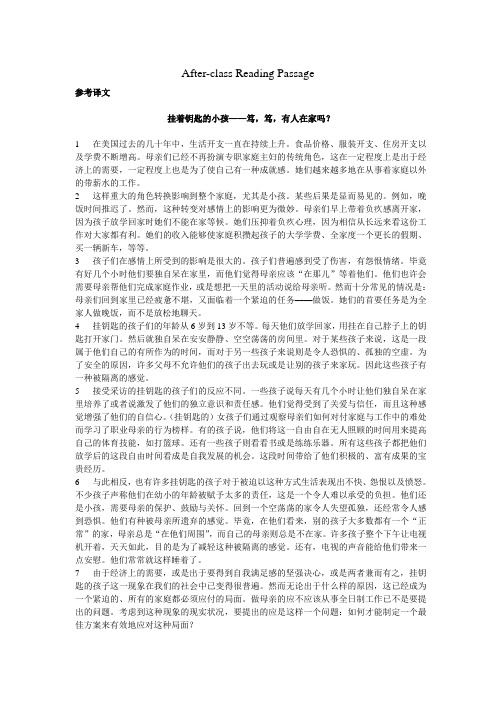
After-class Reading Passage参考译文挂着钥匙的小孩––––笃,笃,有人在家吗?1 在美国过去的几十年中,生活开支一直在持续上升。
食品价格、服装开支、住房开支以及学费不断增高。
母亲们已经不再扮演专职家庭主妇的传统角色,这在一定程度上是出于经济上的需要,一定程度上也是为了使自己有一种成就感。
她们越来越多地在从事着家庭以外的带薪水的工作。
2 这样重大的角色转换影响到整个家庭,尤其是小孩。
某些后果是显而易见的。
例如,晚饭时间推迟了。
然而,这种转变对感情上的影响更为微妙。
母亲们早上带着负疚感离开家,因为孩子放学回家时她们不能在家等候。
她们压抑着负疚心理,因为相信从长远来看这份工作对大家都有利。
她们的收入能够使家庭积攒起孩子的大学学费、全家度一个更长的假期、买一辆新车,等等。
3 孩子们在感情上所受到的影响是很大的。
孩子们普遍感到受了伤害,有怨恨情绪。
毕竟有好几个小时他们要独自呆在家里,而他们觉得母亲应该“在那儿”等着他们。
他们也许会需要母亲帮他们完成家庭作业,或是想把一天里的活动说给母亲听。
然而十分常见的情况是:母亲们回到家里已经疲惫不堪,又面临着一个紧迫的任务––––做饭。
她们的首要任务是为全家人做晚饭,而不是放松地聊天。
4 挂钥匙的孩子们的年龄从6岁到13岁不等。
每天他们放学回家,用挂在自己脖子上的钥匙打开家门。
然后就独自呆在安安静静、空空荡荡的房间里。
对于某些孩子来说,这是一段属于他们自己的有所作为的时间,而对于另一些孩子来说则是令人恐惧的、孤独的空虚。
为了安全的原因,许多父母不允许他们的孩子出去玩或是让别的孩子来家玩。
因此这些孩子有一种被隔离的感觉。
5 接受采访的挂钥匙的孩子们的反应不同。
一些孩子说每天有几个小时让他们独自呆在家里培养了或者说激发了他们的独立意识和责任感。
他们觉得受到了关爱与信任,而且这种感觉增强了他们的自信心。
(挂钥匙的)女孩子们通过观察母亲们如何对付家庭与工作中的难处而学习了职业母亲的行为榜样。
新编大学英语第三册第3单元课文翻译

新编大学英语第二版第三册第三单元课文翻译编著:浙江大学出版社:外语教学与研究出版社挂钥匙的孩子——笃、笃,家里有人吗?在过去的几十年中,美国的生活费用一直在持续增长。
食品价格。
服装费用、房子开销和学费都越来越高。
母亲们纷纷放弃传统的全职家庭主妇的角色,这一部分是由于经济需要,一部分是想通过工作取得成就感。
她们越来越多地从事家庭以外的有薪水的工作。
如此重大的角色转换影响着整个家庭,尤其是孩子们。
某些后果是非常明显的。
例如,晚饭时间推迟了。
而另一方面,这种转变对情感的影响就更微妙了。
母亲们早上带着愧疚感离开家,因为孩子放学回来时她们会不在家。
她们压抑着愧疚心理,因为她们相信她们的工作从长远来讲对大家有益。
她们的收入将能够使家庭存下钱来供孩子上大学。
度一次长假、买辆新车,等等。
孩子们在情感上所受到的影响是很大的。
通常,孩子会感到受伤和愤怒。
毕竟,他们一个人呆几个小时,他们感到他们的母亲应该“在那儿”等着他们。
他们可能需要有人帮他们完成作业,或者想把一天的活动说给母亲听。
然而,母亲们通常筋疲力尽地回到家,又要面临一个紧迫的任务——准备晚饭。
她们的首要任务是给全家人做晚饭,而不是轻松的聊天。
挂钥匙的孩子年龄从六岁到十三岁不等。
每天,他们放学回家,用挂在脖子上的钥匙打开门,独自一人,孤孤单单地呆在安静而空荡荡的屋子里。
对某些孩子来说,这段个人时间是很有所作为的,而对于另外一些孩子,却是令人害怕的孤单的空虚。
由于安全原因,很多父母不允许孩子出去玩,或带客人到家里来。
因此,孩子们感到一种被隔离的感觉。
被采访的挂钥匙的孩子们反应不同。
一些孩子说,每天自己呆上几个小时培养或激发了他们的独立意识和责任心。
他们感到被爱、被信任,并且这一感觉鼓励他们自信。
挂钥匙的女孩子通过观察母亲如何持家和工作,学习了职业母亲的行为榜样。
一些孩子称他们利用这段不受监督的自由时间来提高他们的运动技能,如打篮球。
还有一些孩子读书或练习乐器。
- 1、下载文档前请自行甄别文档内容的完整性,平台不提供额外的编辑、内容补充、找答案等附加服务。
- 2、"仅部分预览"的文档,不可在线预览部分如存在完整性等问题,可反馈申请退款(可完整预览的文档不适用该条件!)。
- 3、如文档侵犯您的权益,请联系客服反馈,我们会尽快为您处理(人工客服工作时间:9:00-18:30)。
Unit 1 Personality羞怯的痛苦对许多人来说,羞怯是很多不愉快的起因。
各种各样的人——矮的、高的、愚笨的、聪明的、年轻的、年老的、瘦的、胖的——都说自己是羞怯的。
羞怯的人会焦虑不安,感到不自然;也就是说,他们过分地关注自己的外表和举止。
脑海中不断盘旋着一些使自己不安的想法:我给人留下的是什么印象?他们喜欢我吗?我讲话是不是傻里傻气?我长得难看。
我穿的衣服毫不引人注目。
很显然这种不安的感觉会对人产生不利的影响。
一个人的自我看法反映在自己的行为方式之中,而一个人的行为方式又影响他人的反应。
通常,人们如何看待自己对他们生活的各个方面都会产生深刻的影响。
例如,具有积极的自我价值观或很强自尊心的人往往表现出自信。
而由于自信,他们不需要他人不断地称赞和鼓励,也能使自己感觉良好。
自信者热情、自发地投入生活。
他们不因别人认为他们“该”做什么而受到影响。
有很强自尊心的人不会被批评所伤害;他们不会把批评看作是人身攻击。
相反,他们认为批评是一种提醒他们改进的建议。
相比之下,羞怯的人自尊心较弱,往往消极被动并且容易受他人影响。
他们(是否)在做“该做的事情”需要得到别人的肯定。
害羞的人对批评非常敏感;他们觉得批评正好证实了他们比别人差。
他们也很难因别人的赞美而高兴,因为他们相信自己不值得称赞。
羞怯的人也许会用这样的话来回答别人的赞美之辞:“你这么说只是为了让我感觉好一些。
我知道这不是真的。
”显然,尽管自我意识是一种健康的品质,过分的自我意识却是不利和有害的。
能否彻底消除或者至少减轻羞怯感呢?幸运的是,人们能够通过坚持不懈的努力建立自信从而克服羞怯。
由于胆怯和缺少自尊是密切相关的,因此正视自己的弱点和正视自己的优点一样重要。
例如,大多数人希望每门功课都得A。
如果仅仅因为在某些领域有困难,就把自己列为差生,这不恰如其分。
人们对自己的期望必须现实。
老是想那些不可能的事情会令自己觉得无能,甚至产生嫉妒。
当我们嫉妒比自己成绩好的学生时,我们正在自我否定。
如果你害羞,这里有些具体有效的步骤帮助你树立信心并克服羞怯感:1.认清自己的优缺点。
每个人既有优点又有缺点。
随着对自我的不断认同,羞怯感就会自然减弱。
2.确定合理的目标。
例如,在聚会时和一群陌生人在一起,你也许会怯场。
不要以为你必须和每个人交谈。
集中精力,仅和一两个人交谈,你会感到更自在些。
3.内疚和羞耻感是消极的情感。
不要把时间和精力浪费在这上头。
假设你伤害了某人的感情,(光)感到羞愧是无济于事的。
相反,应该承认你犯了个错误,并决心在将来更加善解人意。
4.所有问题都有许多种解决办法。
很少有完全正确或完全错误的意见。
要敢于公开表达自己的观点。
5.不要对自己做消极的评论。
这是一种自我否定。
千万别把自己描述为愚蠢的、丑陋的,或者一个失败者。
注重自己积极的方面。
6.接受批评时要缜密思考。
不要把批评理解为人身攻击。
例如,如果一位朋友抱怨你的烹饪技术,要把这当成对你的烹饪技术而不是对你本人的评价而接受下来。
放心,你们还是好朋友,但你的烹饪技术也许确实有待改进。
7.记住,每个人都会经历一些失败和挫折。
要把它们作为增长见识的经历,从中受益。
挫折往往会成为转机,随之而来的将是一段美妙绝伦的经历。
例如,你可能被你所中意的大学拒之门外。
然而,在你就读的大学里,你可能发现这里教育的某一特点比你料想的好得多。
8.有些人会使你感到自己无能,不要和这种人交往。
去设法改变他们对你的态度或者改变你对自己的态度,要不就脱离这种关系。
伤害你的人并不关心你的最大利益。
9.留出时间休息,享受自己的业余爱好,并且定期地重新审定自己的目标。
为此所花费的时间有助于更好地了解你自己。
10.多在社交场合中锻炼。
不要把自己同他人隔离开来。
设法一次结识一位朋友;最终你将能够娴熟而自信地在众人中周旋。
我们每个人都是独一无二、难能可贵的个体。
我们自有吸引人的地方。
我们对自己了解得越多,就越容易充分发挥自己的潜力。
不要让羞怯成为阻碍我们拥有丰富和成功生活的绊脚石。
Unit3 Social Problems钥匙儿童,铛铛,有人在家吗?1在美国的生活费用一直在稳步上升,在过去的几十年里。
食品价格上涨,衣着费用,住房费用,学费不断越来越高。
部分原因是财政的需要,部分原因是个人职业选择完成,母亲已经离开的传统作用全职家庭主妇。
越来越多,他们已采取工薪家庭以外的就业机会。
2制作这样一个重要的角色变化影响到整个家庭,尤其是儿童。
一些后果是显而易见的。
例如,晚餐是在稍后小时。
情绪的影响,另一方面,可以更加微妙。
母亲离家上午,感觉有罪,因为他们不会主页返回时,他们的孩子上学。
他们压制他们有罪,因为他们相信,他们的工作将会造福于每个人的长期利益。
收入将使家庭节省的大学学费,采取了延长假期,买一辆新车,等等。
3情绪影响的儿童可能会很大。
这是很常见的儿童感到伤害和怨恨。
毕竟,他们仅仅几个小时,他们觉得,他们的母亲“应该有”他们。
他们可能需要协助他们的家庭作业或想分享当天的活动。
常常,然而,到达家庭的母亲用尽,面对眼前的任务的准备晚餐。
其重点是使晚餐的家庭,而不是从事轻松的交谈。
4钥匙儿童的年龄范围从6个增加到13个。
每天都在他们返回学校和解锁门家园的关键挂在脖子。
他们现在对自己的,独立,在安静的,空的房间。
对于一些青少年,这是一个生产期间的私人时间,而另一些人是可怕的,寂寞是无效的。
基于安全的理由,许多家长禁止孩子出去玩,或有旅客在家里。
青少年,因此,感到孤单。
5钥匙儿童谁采访报道不同的反应。
一些钥匙儿童说,正在自己的几个小时,每天培养,或刺激,意识的独立性和责任。
他们认为爱和信任,这种感觉鼓励他们自信。
钥匙女孩,通过观察他们的母亲应付需求的家庭和工作,学习的榜样,一个工作的母亲。
有的孩子说,他们利用他们的空闲时间无人监管,完善他们的运动技能,如打篮球。
其他看书或练乐器。
这些孩子看待他们的自由时间放学后的个人发展机会。
它导致积极的,富有成效的,和宝贵的经验。
6另一方面,许多钥匙儿童表示非常痛苦,怨恨和愤怒的正生活在这种方式。
许多人声称,鉴于太多的责任是对他们在幼年;这是一个压倒性的负担。
他们是谁没有人真的很想得到保护,鼓励和关怀,通过注意从他们的母亲。
回家的空房子,令人失望,孤独,而且往往是可怕的。
他们认为他们的母亲所抛弃。
毕竟,它似乎他们大多数其他儿童的“正常”的家庭,其母亲“周围”,而自己的母亲从来没有回家。
许多儿童开启电视的整个下午一天,以减少感情隔离;此外,声音安慰。
通常情况下,他们会打瞌睡。
7由于任何经济上的需要,或为个人的坚定决心履行,或两者兼而有之,但这种现象的钥匙儿童是我们社会中普遍存在。
不管什么原因,这是一个引人注目的情况,家庭必须应付。
要问的问题不是是否应该母亲应全时工作。
鉴于现实情况,这个问题问的是:如何以最佳的计划制定出有效地处理这种情况。
8这是可取的所有家庭成员,以表达自己的感情和关注,不可避免的改变坦率。
这些言论应该充分讨论。
许多因素必须考虑到:孩子们的个性和成熟,所需的时间将孩子单独,安全的社区,获得帮助,如遇紧急情况。
最高法院重要的是质量的关系,父母与子女之间。
最重要的是,儿童是安全的知识,他们的喜爱。
爱的感觉提供了宝贵的精神力量,成功地对付几乎所有的困难,在生活中出现。
(760字)Unit 4 Career Planning职业生涯规划1职业生涯规划不一定例行或合乎逻辑的步骤。
我们每个人都在不同的地方体重因素,可考虑某些阶段的职业规划,在不同的时间。
职业规划包括收集有关自己和了解职业,估计各种可能的结果的行动,最后,选择的替代品,我们认为有吸引力的和可行的。
2许多观察家指出,学生是不是非常有效的职业生涯规划。
他们列举的证据表明,大多数学生中选择一种十分狭隘集团的职业;多达40至百分之六十选择专业职业,而实际上只有15日至18日的百分之劳动力从事专业工作;年轻人表现出惊人的缺乏兴趣的文书,销售,服务等职业,尽管这些领域提供了许多就业机会;多达三分之一的学生无法表示任何选择职业。
3在书中决策,欧文詹尼斯和莱昂曼确定中存在的严重缺陷的方法很多人作出决定。
这些缺陷似乎与模式的人使用,以应付的问题。
第一个漏洞是自满。
谁无视人民挑战的信息作出的选择,他们表现出的自满。
人们谁采取的态度是“这不会影响我”或“这绝不会发生”使用自满为主导的模式行事。
当然,自满是适当的任何决定,其中任何事关重大,但这并不说明职业生涯的决定。
4第二个漏洞,人们应付决定是防御撤销。
当面对的是一个决定,并不能认为他们可以找到一个可以接受的解决办法,有些人保持冷静,通过诉诸一厢情愿或白日梦。
学生谁不想想影响他们的职业选择往往从事合理化(欺骗自己与自我满足,但不正确的解释,一个人的行为)或拖延(推迟或拖延)。
面临的形势可能会产生焦虑,但检查的替代品也可提供救济。
5第三个漏洞是hypervigilance。
这发生在职业生涯决策当人们认为,没有足够的时间来寻找解决办法,他们的恐慌。
他们疯狂地寻找职业的可能性和抓住匆忙发明的解决办法,忽略了他们所选择的后果以及其他替代方案。
人谁在恐慌有时并不认为明确或逻辑。
6最好的因应行为是警惕。
警惕决策时,就会发生人认为,选择,应作出,他们可以找到一个解决办法,并且有足够的时间。
在这种情况下,学生可以进行有效的寻找替代的职业,认真评估每一个备选方案,并制定应急计划,以防一种或另一种风险出现。
7以下是关键的职业规划。
8 。
研究自己。
这是关键的职业规划。
了解你喜欢,你的价值,以及你想成为的基础是所有职业规划。
在学习,你检查你的长处和短处,自己的目标,以及您个人的趋势发展。
自我的理解是,您可以获得您可以想像某些职业可能最适合你的个性,兴趣,能力和目标。
所有职业的决定,要求我们既要了解自己,了解有关工作,并结合这两种知识。
9 。
撰写您的职业目标了。
有用的技术,组织观念的职业发展实际上是为写下来的时间在你的生活区块。
写下来部队您结晶您的思想和认识不清,半形成的想法。
这可能导致新的见解您的可能性和可帮助您查看新的关系,模式和趋势,或找出差距在你思考你的职业发展。
10 。
修改您的计划和进度定期与他人。
每个经常,评估您的情况,并考虑了哪些步骤将采取下一步。
考虑库存的进展和规划进一步的步骤可以帮助您解决的变化,你的经历和变化,在劳动力市场。
谈到自己的计划,高校辅导员,你的父母,和你的朋友可以帮助您确定您的目标和改善你的职业生涯规划或使他们的工作。
11 。
如果您选择的职业不适合你,你可以从头开始。
今天,越来越多的男子和妇女正在改变职业或取得第二次启动的事业有更大的呼吁他们。
许多人发现他们谁行的工作是不能令人满意的克制,为不同的占领。
往往是他们新的职业,是他们忽略了他们年轻的时候,或者说他们没有机会继续在那个时候对金融或其他原因。
